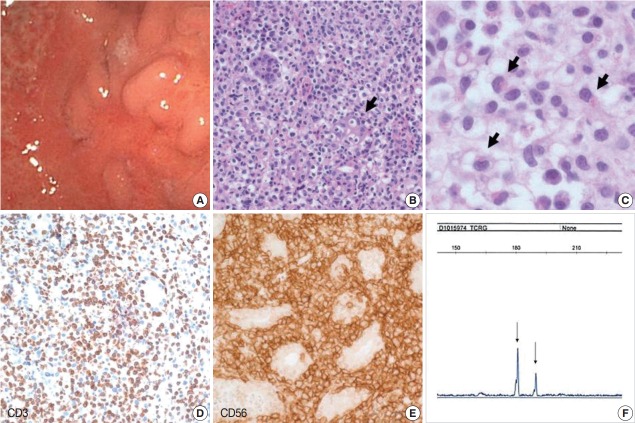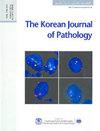Indolent CD56-Positive Clonal T-Cell Lymphoproliferative Disease of the Stomach Mimicking Lymphomatoid Gastropathy.
Korean Journal of Pathology
Pub Date : 2014-12-01
Epub Date: 2014-12-31
DOI:10.4132/KoreanJPathol.2014.48.6.430
引用次数: 2
Abstract
Natural killer (NK)- or T-cell lymphomas of the gastrointestinal (GI) tract are uncommon, accounting for less than 10% of all malignant lymphomas arising in the GI tract [1]. According to the third national survey by the Hematopathology Study Group of the Korean Society of Pathologists, peripheral T-cell lymphoma, not otherwise specified (PTCL-NOS), is the most common type, followed by extranodal NK/T-cell lymphoma, nasaltype (ENKL). Enteropathy-associated T-cell lymphoma (EATL) is rare [1]. Malignant lymphoma of T and NK lineage is an aggressive disease with poor prognosis [2]. Recently, two indolent forms of mature T- or NK-cell lymphoproliferative diseases (LPD) of the GI tract have drawn the attention of pathologists. One is indolent NK cell proliferative lesion of the stomach and intestine reported under the name of lymphomatoid gastropathy [3] or NK-cell enteropathy [4]. The lesion is often self-limited, even when left untreated. Histological findings have been described as dense infiltration of lymphoid cells with mild to moderate atypia and peculiar eosinophilic cytoplasmic granules [3]. Frequently, there are lymphoepithelial lesion-like changes with or without necrosis. All cases published previously have been positive for both cytoplasmic CD3 and CD56 and negative for CD4 and CD8. T-cell receptor (TCR) gene rearrangement is polyclonal [3-5], and unlike ENKL, infiltrating cells were negative for Epstein-Barr virus (EBV). The other form of indolent T- or NK-cell LPD of the GI tract is a clonal T-cell proliferative disease involving the oral cavity, esophagus, stomach, small intestine, and colon [6]. The lesion shows a superficial and nondestructive lymphoid infiltrate that occasionally extends into the muscularis mucosae and submucosa. Infiltrating cells are small T-cells, which are CD4+ or CD8+ or uncommonly CD4–/CD8–phenotype [6-9]. CD56 and EBV-encoded RNA (EBER) are negative, and TCR gene rearrangement has been monoclonal in all cases reported so far. Unlike indolent NK-cell proliferative lesions, indolent T-cell LPD does not spontaneously regress, but is persistent without progression [6,9]. These two indolent entities can be easily mistaken as aggressive T- or NK-cell lymphoma; therefore, recognition of these entities is important to avoid unnecessary aggressive chemotherapy. Herein we report, to our knowledge, the first Korean case of indolent T-cell LPD of the stomach with expression of CD56.

模拟类淋巴瘤胃病的无痛性cd56阳性克隆t细胞增生性疾病。
本文章由计算机程序翻译,如有差异,请以英文原文为准。
求助全文
约1分钟内获得全文
求助全文

 求助内容:
求助内容: 应助结果提醒方式:
应助结果提醒方式:


